Chiling Tong: Passing a leadership torch
Updated: 2014-06-27 11:12
By Cai Chunying in Washington(China Daily USA)
|
||||||||
|
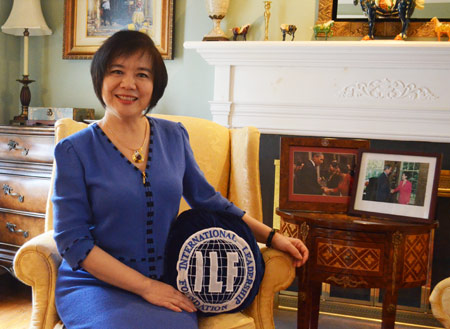 Chiling Tong, founder and CEO of International Leadership Foundation (ILF), sits beside a souvenir ILF cushion and her photos with US presidents George W. Bush and Barack Obama, both of whose administrations she served. Cai Chunying / China Daily |
For Chiling Tong, CEO of the International Leadership Foundation and former US deputy assistant-secretary of Commerce, being a leader herself is not enough. Raising future leaders who share her ethnic background is more imperative and fulfilling.
As the founder of the leadership-skill training organization, Tong has for the past 15 years cultivated more than 1,000 Asian-American youths by helping them gain first-hand knowledge about government and policy issues in the US and preparing them for future success.
It all started with Tong's own engagement with Coro, a San Francisco-based nationally-renowned non-profit organization dedicated to teaching leadership skills to young adults. Tong became one of the only two Asian fellows in 1988 after a rigorous selection process.
"I was so profoundly challenged and had to push myself so hard to excel," said Tong who arrived in the US in 1984 to pursue an MBA degree at the California State University in Long Beach.
It was also through the Coro fellowship that Tong got her first taste of American politics and she liked it.
"In Asia, politics has a bad image and people tend to think it is mysterious. I, however, found politics in the US to be transparent and workable," recalled Tong, who was president of her university's debate team in Taiwan.
"I also realize that being in politics is a difficult thing but the most direct thing to help our community," she said.
Tong heard from time to time derogatory language directed toward Asian Americans, which ran contrary to Tong's observation of her fellow hard-working Chinese Americans and her own ideal of devoting herself as a new immigrant.
After Coro, Tong decided to dive into the public service arena and explore the political system, and she wanted to do it in a way most relevant to Asian Americans.
"I became very much engaged in the civil movement, constantly thinking how to enhance our community to the next level and make us visible and recognized," she said.
Tong first became vice-president of the Community Relations Commission in Monterey Park, California, helping build harmony among Asian, Hispanic and White communities. She then chaired the Los Angeles County Community Action Board to help low-income families in disadvantaged areas and moved on to become community relations coordinator at the state level.
Being a first-line civil servant, Tong soon realized it would take too long for her to move up the ladder and have more impact. There was another track - being a political appointee associating with elected officials.
Tong joined the campaign to help Pete Wilson get elected as California governor in 1991 and became executive assistant to the director of California's employment-development department. During Wilson's second term, Tong was appointed assistant-secretary for international trade and director of the California Office of Trade and Investment in Taiwan.

The experience prepared Tong well. When George W. Bush ran for president in the late 1990s, Tong helped to harvest votes and raise funds from the Asian-American community.
She was appointed commissioner of the White House Commission on Asian Americans and Pacific Islanders afterward and moved on to become deputy assistant-secretary of Commerce for Asia and Pacific in late 2002, becoming one of the few Asian-American cabinet members.
From 2003 to 2009, Tong was chief of staff at the Minority Business Development Agency in the Commerce Department. After President Barack Obama came into office, Tong stepped down from her position.
"There is no job left for you. You have to take care of yourself," said Tong, commenting on the "hard" reality of being a political appointee. "But this is a good thing about American government. New blood comes in and people in new positions push themselves to perform."
Tong, however, was later invited to serve on the Commerce secretary's Advisory Council on Minority Business Enterprise, continuing her public-policy involvement in the Obama administration, which is not common in American politics and showcased Tong's recognized influence in the field.
Tong also soon found out that turnover among political appointees might also be a good thing for the organization that she and her husband, former assistant deputy-secretary of Transportation Joel Szabat, founded in 1999 to prepare young Asian Americans to be future leaders. She now could devote full time to it.
"We've gained economic strength in this country, but we are still lagging far behind in political power. I want to see our whole Asian-American community advance and lead in many ways," Tong said.
She knows one of the best ways is to start with young people, just as she was inspired by Coro many years ago.
"My training at Coro is so important in my life so I brought the whole concept to the ILF (International Leadership Foundation)," said Tong, who later served on Coro's alumni board, and refined her leadership training at Harvard Kennedy School from 2012 to 2013.
She also has poured her 25-year-career serving local and federal governments and all the networks she has harvested along the way into the organization.
"Whatever I learn, I apply to my ILF. It is just like our child, I want to pass all my resources and all my experiences to the next generation. I want them to be better," said Tong, calling her husband her best partner and friend. "He does this also for his own country. If Asian Americans can succeed, they would help the country more."
The foundation runs two signature programs: the Civic Fellowship Program and the Young Ambassadors Program.
The Civic Fellowship Program brings promising Asian-American undergraduates from leading US universities to intern at various federal government agencies in the summer, including the White House, Congress and the Commerce Department.
The Young Ambassadors Program recruits students from the Chinese mainland and Taiwan to come to the US to learn about government systems and leadership training by participating in a 12-day session of lectures, seminars and field trips.
Tong has expanded ILF to 15 chapters in the nation, composed of renowned community and business leaders. She constantly travels to those locations, promoting civic awareness and helping local representatives recruit students, run lectures and conduct scholarship fundraising.
Tong also has local educational seminars and an annual conference in place, bringing together a wide range of Asian-American national politicians as a way for her students to interact with real leaders and envision their own future.
"I like people and I love my community. If I see something right, I just want to lead people in that direction."
charlenecai@chinadailyusa.com
(China Daily USA 06/27/2014 page11)

 Daredevil dancer conquers mountain
Daredevil dancer conquers mountain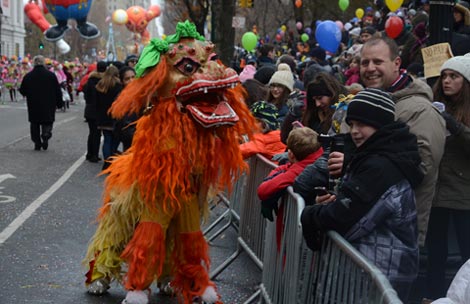
 Chinese float gives joy at Macy's parade
Chinese float gives joy at Macy's parade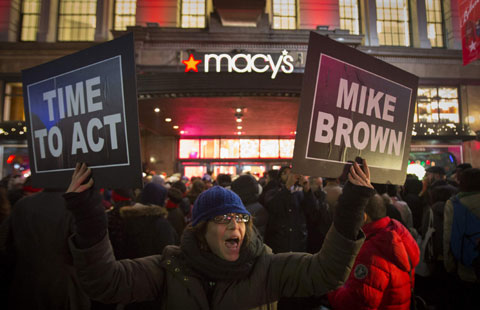
 Calm comes to troubled Ferguson
Calm comes to troubled Ferguson
 6 things you should know about Black Friday
6 things you should know about Black Friday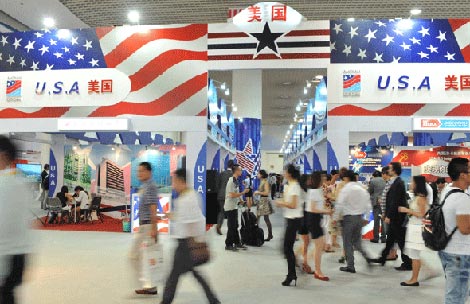
 Visa change may boost tourism to the US
Visa change may boost tourism to the US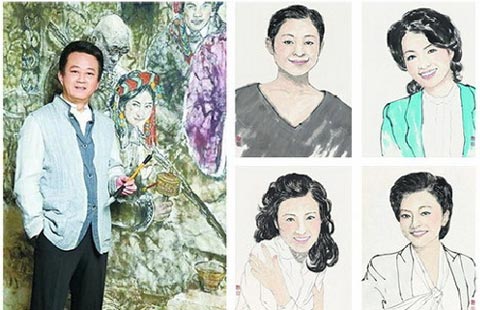
 China's celebrity painters
China's celebrity painters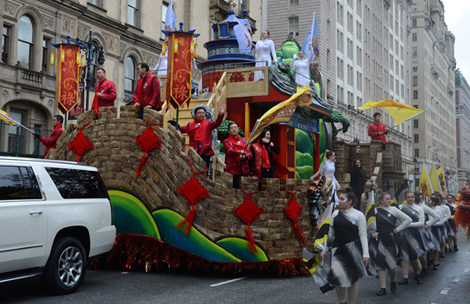
 Beauty of Beijing float making debut in Macy's parade
Beauty of Beijing float making debut in Macy's parade
 Rescue dogs show skills in NW China
Rescue dogs show skills in NW China
Most Viewed
Editor's Picks

|

|

|

|
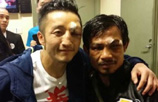
|

|
Today's Top News
China, US fight terror on the Internet
How to give is focus of philanthropy forum
China, US diverge on approaches to nuclear energy
China's local govt debt in spotlight
Macy's looks to appeal to more Chinese customers
Clearer view of Africa called for
Cupertino, California council is majority Asian
BMO Global Asset Management Launches ETFs in Hong Kong
US Weekly

|

|







